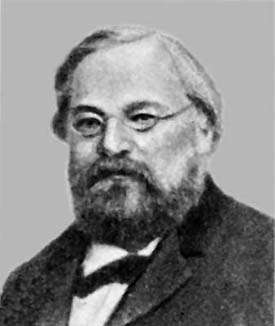
Nicolai Vasilievich Bugaev
 المؤلف:
D F Egorov
المؤلف:
D F Egorov
 المصدر:
The scientific works of N V Bugaev
المصدر:
The scientific works of N V Bugaev
 الجزء والصفحة:
...
الجزء والصفحة:
...
 19-12-2016
19-12-2016
 1026
1026
Born: 14 September 1837 in Dusheti (near Tiflis, now Tbilisi), Georgia
Died: 11 June 1903 in Moscow, Russia

Nicolai Vasilievich Bugaev's father was a medical doctor in the army. When Bugaev was ten years old his father sent him to Moscow to be educated. It was not an easy life for the young Bugaev for he had to earn extra money giving tuition in order to make have enough money to live on.
In 1855 Bugaev entered the Faculty of Physics and Mathematics at Moscow University. He graduated four years later and went to St Petersburg to study at the Engineering Academy there. At this point Bugaev was not concentrating on mathematics, although his courses had included a very strong background in mathematics. However, he returned to Moscow in 1861 with the intention of concentrating on mathematics from that time on.
He wrote a Master's thesis on convergence of infinite series at the University of Moscow which he submitted and successfully defended in 1863. The work of this thesis is important and the paper [8] is concerned with the subsequent development of ideas on general tests of convergence of infinite series contained in Bugaev's thesis. It should be remembered that a Master's thesis in Russia at this time was essentially equivalent to the doctorate at a British or American university today. After this Bugaev decided that he should study abroad to complete his education. Over a period of two and a half years he studied under Kummer and Weierstrass in Berlin and Liouville in Paris.
In 1866 Bugaev submitted his doctoral thesis on numerical identities associated with the number e. A Russian doctoral thesis being essentially the equivalent of the German Habilitation thesis, then Bugaev's appointment as professor at Moscow University followed in 1867.
His research was mainly on analysis and number theory. Bugaev gave proofs of theorems stated without proof by Liouville. He wrote on algebraic integrals of certain differential equations. His work in Moscow was to lead to the creation of the Moscow school of the theory of functions of a real variable in 1911, eight years after his death by Egorov, one of his students. Sonin was another of Bugaev's pupils who went on to make a major contribution to mathematics.
Bugaev's most important work in number theory was based on an analogy between some operations in number theory and the operations such as differentiation and integration in analysis. Bugaev built a systematic theory of discontinuous functions which he called arithmology.
Bugaev also published papers on the philosophy of mathematics such as Les mathématiques et la conception du monde au point de vue philosophie scientifique (1898) which he delivered at the International Congress of Mathematicians at Zurich in 1897. In this work Bugaev describes mathematics as based on the theory of functions, with geometry and the theory of probability having a minor role. Bugaev claims that these contain all that is necessary:-
... to develop the fundamental principles of the scientific and philosophical conception of the world.
In [5] Demidov sees Bugaev's work on the philosophy of mathematics as contributing to the foundation of the school of real analysis. The philosophical concepts, Demidov writes:-
... established an important component of the philosophic context in which the formation of the Moscow school of the theory of functions of one real variable unfolded at the beginning of the twentieth century.
The theorem relating convergence almost everywhere and uniform convergence by D F Egorov, one of Bugaev's pupils, in 1911 is seen as marking the beginning of the Moscow school of the theory of functions of a real variable.
Bugaev was one of the founders of the Moscow Mathematical Society, its vice president from 1886 and its president from 1891. He led a campaign for Russian authors to write in Russian and this led to the developing of Russian mathematical terminology.
- A Volodarsky, Biography in Dictionary of Scientific Biography (New York 1970-1990).
http://www.encyclopedia.com/doc/1G2-2830904841.html
Books:
- D F Egorov, The scientific works of N V Bugaev (Russian) (Kiev, 1904).
Articles:
- Articles in Matematisheskii sbornik 25 (1-2) (1904-1905).
- S S Demidov, N V Bugaev and the origin of the Moscow school of the theory of functions of a real variable (Russian), Istor.-Mat. Issled. 29 (1985), 113-124.
- S S Demidov, N V Bougaiev et la création de l'école de Moscou de la théorie des fonctions d'une variable réelle, Mathemata, Boethius: Texte Abh. Gesch. Exakt. Wissensch. XII (Wiesbaden, 1985), 651-673.
- F Ja Sevelev, Notes à 'L'Aperçu' de N V Bugaev (Russian), Istor.-Mat. Issled. 12 (1959), 551-558.
- F Ja Sevelev, On the history of the Moscow Mathematical Society (Russian), 1966 History Methodology Natur. Sci. No. V (Moscow, 1966), 62-74.
- F Ja Sevelev, On the history of the Moscow Mathematical Society (Russian), Vestnik Moskov. Univ. Ser. I Mat. Meh. (6) (1963), 71-78.
 الاكثر قراءة في 1830to1839
الاكثر قراءة في 1830to1839
 اخر الاخبار
اخر الاخبار
اخبار العتبة العباسية المقدسة


